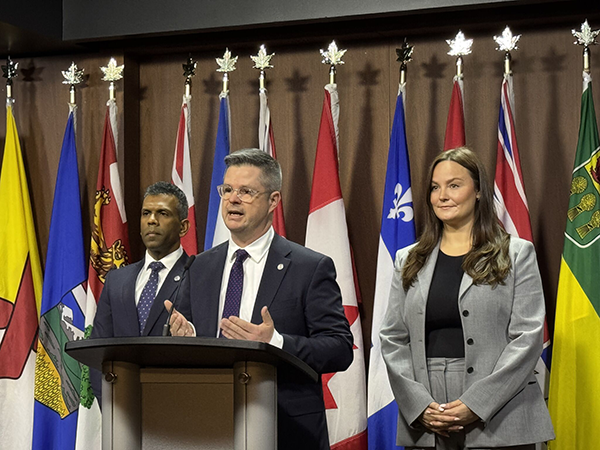National construction stakeholders say they believe the election of a new Liberal government under Prime Minister Mark Carney represents a significant departure from the previous regime under Justin Trudeau, and that there’s now a meaningful opportunity for the two main parties to collaborate on critical development policy.
Voters sent a strong message in electing a more business-oriented prime minister with a greater focus on economics supported by data, said Ken Lancastle, COO of the Mechanical Contractors Association of ĚěĂŔÓ°Ôş, and also sending a large wave of Conservatives to Ottawa who will reinforce the need for new energy and industrial strategies.
“It is the same Liberal banner, but I think there was a fairly clear message that’s been sent to the Liberal Party, as well as to parliamentarians, that, in terms of the parliamentary makeup, that Canadians would like to see a government that moves closer to the centre,” said Lancastle, noting the demise of the NDP.
“I think there’s positivity that we as an industry can look at right now that this is a government that’s going to be mindful of the needs of industry.”
Liberals rebound
The Liberals rebounded from a 20-plus-point deficit in public opinion polls after Carney was selected the new Liberal leader and subsequently sworn in as prime minister on March 14.
During the campaign that followed the former central banker presented himself as the best candidate to deal with the turbulence of the Donald Trump administration, and his party was rewarded with a minority government as voters made their choices April 28.
The Liberals took 169 seats to 144 for the Conservatives led by Pierre Poilievre.
Both main parties supported a national energy corridor, quicker approvals for projects, removal of interprovincial trade barriers and new homebuilding on a massive scale.
“We don’t support any particular party or candidate, but we do support good policy. What we’ve seen is an abundance of good policy and timely policy offered by the government and by the opposition, which presents a great opportunity for some real, constructive, multi-partisan policy-making,” commented John Gamble, president and CEO of the Association of Consulting Engineering Companies – ĚěĂŔÓ°Ôş.
“That is, to me, very exciting and very exciting for the country.”
Canadian Construction Association (CCA) president Rodrigue Gilbert noted all parties had focused on building new Canadian capacity and infrastructure, with the CCA’s national Construction for Canadians initiative emphasizing the importance of construction in building up a stronger ĚěĂŔÓ°Ôş.

Gilbert and Gamble both said their associations were consulted frequently by the contenders as they developed economic policy, and suggested they were confident the collaborations would continue as the Carney government further advanced policy.
“We all need to be aligned and work with government, because that battle is not over, and it’s imperative that we work together, and mostly we need to work towards the same goal,” said Gilbert.
Appreciating industry
Lancastle said his association welcomed the Liberal pledges to remove unnecessary barriers to project approvals and recognize the importance of the mechanical trades in expanding the economy.
“It’s not as simple as just throwing money and saying this is the investment that we’re making in future infrastructure projects,” he said. “It’s recognizing what the work needs to be, who’s going to be doing the work, when that work is going to be happening. In doing that, the government then has a better, greater appreciation of how our industry can support those policy objectives.”
Gamble agreed, saying the new government has in Carney a leader who respects data and “understands the big picture” but it remains to be seen whether the team he assembles delivers effective programs.
ĚěĂŔӰԺ’s Building Trades Unions underscored the need for collaboration in a post-election statement from CBTU executive director Sean Strickland: “Unionized construction workers are the backbone of our national economy…We are committed to ensuring these workers have a voice at the table as our government makes critical decisions on its energy future and industrial development.”
Other stakeholders issued statements as follows:
- Canadian Home Builders’ Association CEO Kevin Lee noted the threat of tariffs and stated, “It will be extremely important for the incoming government to build on its commitments to market-rate housing supply and affordability during its most recent term, and to continue to engage with our industry.”
- LIUNA international vice-president Joseph Mancinelli said, “On behalf of 160,000 members across ĚěĂŔÓ°Ôş, we will be holding this government accountable on their campaign promises in housing and infrastructure, skilled trades and apprenticeships, interprovincial trade and our economy.”
- Carpenters’ Regional Council president Tom Cardinal said the union looked forward to advancing “shared priorities” including increasing investment in new infrastructure to create more work opportunities for tradespeople and developing more pathways for apprenticeship.
- “We look forward to working with the Carney government to achieve his goal of making ĚěĂŔÓ°Ôş an energy superpower,” said Paul de Jong, CEO of the Progressive Contractors Association of ĚěĂŔÓ°Ôş. “However, we know that will require a different approach, starting with a clear, objective approvals process for getting projects of national interest built without any more lengthy delays.”



Recent Comments